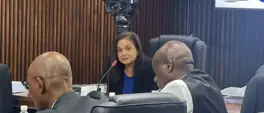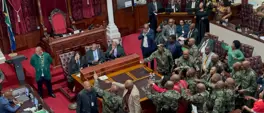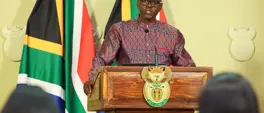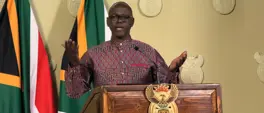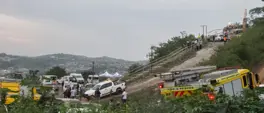Gauteng e-hailing structures partner with metro police depts to formalise safety plans for industry
Ntokozo Khumalo
31 July 2025 | 5:43The South African Meter Taxi and E-Hailing Association, alongside the Gauteng E-Hailing Services, announced this during a media briefing on Wednesday.

The South African Meter Taxi and E-Hailing Association and the Gauteng E-Hailing Services (GES) join hands in bid to formalise & regulate sector. Picture: EWN
JOHANNESBURG - Gauteng e-hailing structures have partnered with the metropolitan police departments in the province to formulate safety plans for the industry.
The South African Meter Taxi and E-Hailing Association, alongside the Gauteng E-Hailing Services (GES), announced this during a media briefing on Wednesday.
ALSO READ:
- Gauteng e-hailing, meter taxi associations engaging taxi industry to find ways to co-exist
- Gauteng e-hailers urged to apply for permits to comply with National Land Transport Act
The structure highlighted the need for regulation and formalisation in the sector to protect the interests of e-hailing operators and riders.
The collective’s chairperson, Thato Ramaila, stressed that the unification of operators can help the industry move forward and become a safe and compliant sector.
“Safety in e-hailing is a shared responsibility. GS is in partnering with SAPS, Metropolis, CPF structures, private security, and platform companies to deliver a robust safety plan that includes mostly panic buttons that are linked to rapid response teams, centralised incidents reporting system, vetting and registration of compliant operators, [and] vehicle tracking and roadside assistance partnership.”
GES warned that the lack of regulations in the industry opens the door to criminality.
Ramaila said drivers need to apply for operating permits to comply with the National Land and Transport Act.
The chairperson stressed the importance of formalising the sector to create accountability channels which customers, as well as drivers, can always go to.
He also added that with regulations in place, operators will not be left vulnerable.
“Without regulation, without formalisation, the app companies, the app regulation fails when operators are not formalised. Members will forever be striking, will forever be going on the street, asking questions that nobody can answer. Most people need to understand that when it comes to an app, apps are service providers. They are not the public transport service providers. The operators are the public transport providers.”
Get the whole picture 💡
Take a look at the topic timeline for all related articles.
Trending News
More in Local

15 December 2025 18:44
EWNTV NEWS BULLETINS | Batohi walks out, Ntuli survives vote and Starlink BEE row escalates

15 December 2025 15:40
Gauteng Education mourns 'major loss' after Kempton Park principal killed in Tembisa house robbery

15 December 2025 15:13
Cape Town marine sewage outfall dispute heads to independent appeals panel


